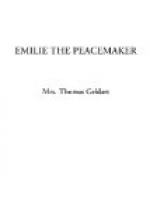“Then Sarah tried that day and the next, but found it hard work; the boys quarrelled and fought, and the little once scratched and cried, and their mother came and beat one or two of the worst, but all did no good. There was no peace till bed time; still I encouraged her and told her, you know, about ‘a soft answer turning away wrath,’ and since that time, she has less often given railing for railing; and has not huffed and worried them, as elder sisters are apt to do. She is a good girl, is Sarah, but here comes the Missis home from market.” “The Missis” certainly did not look very sweet, and her heavy load had heated her. She did not welcome Edith pleasantly, which, the old man observing, led her away to a little room he occupied at the back of the cottage, and showed her the corallines.
Edith saw plainly that though the poor father offered her any of them she liked to take, he suffered in parting with them, so calling Dick and Mary, she asked if they would hunt for some for her, like those in grandfather’s stores. They consented joyfully, and Edith promising often to come and see the old man, ran down the cliff briskly, and hastened home. She thought a good deal as she walked, and asked herself if she should have had the patience and the gentleness of that poor cottage girl; if she should have soothed Susy, and comforted Dick and Mary; if she should have troubled herself to kneel down in the broiling sun and build up a few trumpery shells into a grotto, to be upset and destroyed presently. She came to the conclusion that for good, pleasant, prettily behaved children, she might have done so, but for shrieking, passionate, quarrelsome little things as they appeared to her then, she certainly should not. She felt humbled at the contrast between herself and Sarah; and when she arrived at home, for the first time, perhaps, in her life, she patiently bore her mamma’s reproaches for being so late, and for the impropriety of walking away from her sisters, no one knew where. She was not yet quite skilled enough in the art of peace, to give the “soft answer;” but her silence and quietness turned away Mrs. Parker’s wrath, and after dinner, Edith prepared herself for the visit of her dear Emilie.
CHAPTER FOURTH.
THE HOLIDAYS.
Mrs. Parker and her two elder daughters were going to pay a visit to town this summer, and as Edith was not thought old enough to accompany them, Mrs. Parker resolved to ask Emilie to take charge of her. The only difficulty was how to dispose of aunt Agnes; aunt Agnes wishing them to believe that she did not mind being alone, but all the while minding it very much. At last it occurred to Emilie that perhaps Mrs. Crosse, at the farm in Edenthorpe, a few miles off, would, if she knew of the difficulty, ask aunt Agnes there for a few weeks. Mrs. Crosse and aunt Agnes got on so wonderfully well together, and as she had often been invited, the only thing now was to




